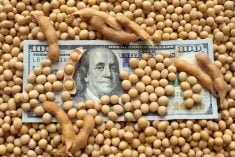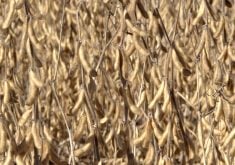Beijing | Reuters –– Small dairy farmers in China are dumping milk and selling cows as demand from processors slows in a sharp turnaround from last year, when a scramble for supplies prompted a huge surge in milk powder imports.
Slower growth in milk product consumption, higher yields from modern dairy farms and the excess stocks of imported powders have combined to reduce demand for fresh milk in what has been one of the world’s fastest-growing dairy markets.
Small farmers — many with fewer than 100 cows — in Shandong, Qinghai and Hebei province are pouring milk down drains, according to local media reports, while others are feeding surplus milk to pigs.
Read Also

U.S. grains: Soy futures post biggest monthly gain in nearly five years on China trade optimism
U.S. soybean futures climbed to a 15-month high and posted their biggest monthly gain in nearly five years on Friday following a rally fueled by the prospect of revived exports to China.
The agriculture ministry said in a circular on Thursday that all efforts should be made to avoid milk being destroyed, calling on provincial governments to offer subsidies for the storage of milk.
A scandal over tainted milk in 2008 and years of short supply of quality milk have pushed up prices in China to among the world’s highest, fuelling a massive expansion of the sector and rush of capital into the market.
Companies such as China Modern Dairy Holdings and Huishan Dairy built scores of 10,000-head dairy farms to meet consumer demand.
But high prices last year choked off some consumption, and President Xi Jinping’s anti-corruption campaign may also have dented sales of dairy-based gifts, said Sandy Chen, analyst at Rabobank.
Processors have slashed prices more than a tenth from an average 4.27 yuan (C$0.82) per kilogram in February 2014 to around 3.75 yuan at the end December.
For small farmers, who account for about half of the market, prices are as low as two yuan/kg.
“Prices are still coming down for raw milk in what is supposed to be a peak consumption period,” said Chen.
The larger players are also struggling to sell any surplus fresh milk not already contracted to processors, said a manager at a 10,000-head dairy farm who declined to be identified.
“There was massive demand for milk and then it just dried up in the second half of last year,” he said.
Imports of milk powder rose 62 per cent from January to August 2014 compared with the same months the previous year, partly due to worries about supply because of an outbreak of foot-and-mouth disease in 2013.
The milk powder imports declined sharply from August, however, and now excess raw milk could be powderized, implying a poor outlook for imports in 2015, according to Chen.
— Dominique Patton is a Reuters correspondent covering agriculture and soft commodities from Beijing.










